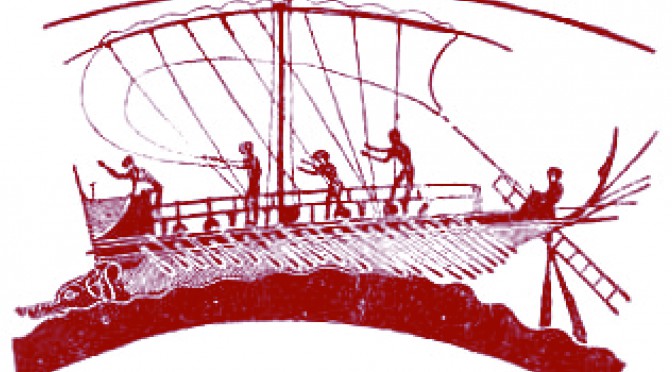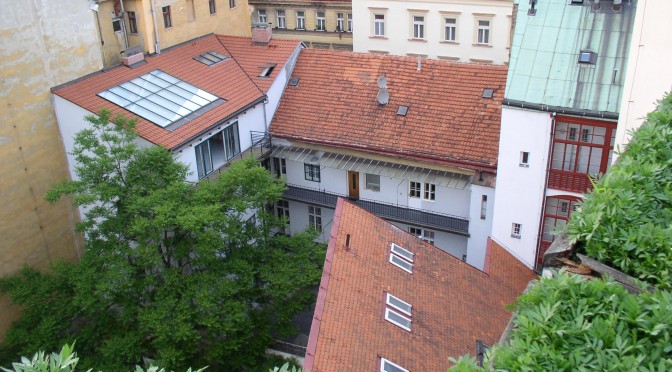
Edita Wolf (FF UK – CEFRES) will give a lecture in the frame of the colloquium series on Antic Philosophy of the Department for the Study of Ancient and Medieval Thought of the Institute of Philosophy of the Czech Academy of Sciences.
Where: Institute of Philosophy of the Czech Academy of Sciences, Jilská 1, Prague 1, conference room.
Language: Czech.
Where: CEFRES, Na Florenci 3.
Organizers: FF UK and CEFRES.
Theatre and Political Communication in the Middle Ages
Focusing on theatre in French, this paper investigates the turn of 15th and 16th century, when theater and print developed hand in hand. Is a “political theater” being then shaped? What circumstances, which authors and actors, play genres, and audiences could such a political communication involve, and with which efficiency?
The Author and its Signature in French, from Chrétien de Troyes to the Renaissance
Signature is considered today as a key-element of the “function author” as defined by Michel Foucault. The recurrent anonymity of Medieval literature led to believe in the lack of signature, and therefore of authors. Yes, from the 12th to the 16th centuries, French-writing authors reflected on signature, on its forms and functions. Signature revealed the status of the author—whether gentle or intellectual, whether man or woman. It defined the genres in which it came up, such as the novel, poetry and autobiography. It shaped the relationship between the writer and the reader.
A former fellow of Ecole normale supérieure, Pr. Estelle Doudet teaches medieval language and literatyre at the University of Grenoble Alpes. She is a member of the Institut universitaire de France. Her works focus on the archeology of media and public communication in French, among which on eloquence and performing arts in the 15th and 16th centuries.
Within the research unit Litt&Arts, she is in charge of the research group on “comparative media studies” and heads the research area on Arts, Literatures, Languages, Human, Cognitive and Social Sciences of Grenoble University.
Among her publications:
- Recueil général de moralités d’expression française, vol. 1, E. Doudet (ed.), Paris, Garnier, 2012.
- Chrétien de Troyes, Paris, Tallandier, 2009.
- Un cristal mucié en un coffre. Poétique de George Chastelain, Paris, Champion, « Bibliothèque du XVe siècle », no. 67, 2005.
- Jean Molinet et son temps, E. Lecuppre-Desjardin, J. Devaux and E. Doudet (eds.), Turnhout, Brepols, 2013.
- 58 published articles publiés – check her profile on Academia.edu.

Program
Monday 14 March – Budapest
3-5 PM
Lecture within the frame of the French-Hungarian Workshop of the Faculty of Arts of Lorand Eötvös University.
Topic: Thinking Dwelling and Housing Beyond National Categories.
Wednesday 16 March – Prague
10 AM-4 PM
A young researcher workshop on “Neighbourhoods”, organized by the Institut of World History of the Faculty of Arts of Charles University, program Erasmus+ TEMA – European Territories: Identity and Development; http://www.mastertema.eu.
Discussant: Lydia Coudroy de Lille.
Convener: Luďa Klusáková.
Language: English.
Where: at CEFRES, Na Florenci 3.
A complete program is available here.
Thursday 17 March – Prague
5:30-7 PM
Lecture by Lydia Coudroy de Lille – in the frame of the European Habitat United Nations regional conference (see the program here).
Topic: How do we call the urban change? The case of Central and Eastern Europe.
Discussant: Pr. Ludĕk Sykora.
Language: English.
Where: Prague Congress Center, room Club D. 5. Kvetna 65, 140 21 Prague 4.
Registration is compulsory on the conference’s website https://www.habitat3.org/prague. The entrance is free.
Session led by Edita Wolf.

A session led by Edita Wolf
While grand narratives constructed by the means of metaphysical philosophy legitimate the modern condition of knowledge, incredulity toward metanarratives characterizes the postmodern condition. In his seminal text, Jean-François Lyotard explores the process of de-legitimation of knowledge claims vis-à-vis the end of grand narratives and the parallel emergence of a new legitimation secured in terms of performance and efficiency in the field of knowledge production. The system of disciplines rooted in speculative discourse is thereby replaced by practice justifiable only by the principles of performance and efficiency. On the basis of Lyotard’s text a revision is needed in relation to contemporary debates on theory of interdisciplinarity, where interdisciplinarity becomes either a political exigency or a notion that should yield a deeper meaning to the present status of knowledge production. Thus interdisciplinarity seems to work as a substitute for the old philosophical notions that is detached from the actual workings of today’s science. A re-reading of The Postmodern Condition, that is of an announcement of the end of the discipline of philosophy by a philosopher, will bring us to a reflection on interdisciplinarity as a particular practice that would not necessarily entail construction of a discourse of legitimation.
Readings:
Jean-François Lyotard. The Postmodern Condition: A Report on Knowledge. Translated by Geoff Bennington and Brian Massumi. Manchester: Manchester University Press, 1984 [1979].
Read the book or alternatively the introduction and pp. 31-70.
Lecture by Michel Wieviorka within the frame of the cycle “Socio-Historical Confrontations” of the Department of Historical Sociology (Faculty of Humanities, Charles University).
Topic: Violence and Democracy.
Language: English.
Where: U Kříže 8, Praha 5 – Jinonice, auditorium 1034.
See the invitation in Czech.



